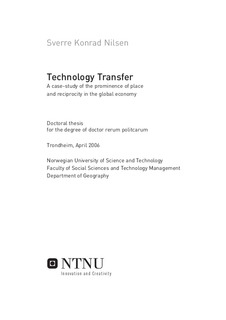| dc.contributor.author | Nilsen, Sverre Konrad | nb_NO |
| dc.date.accessioned | 2014-12-19T14:25:38Z | |
| dc.date.available | 2014-12-19T14:25:38Z | |
| dc.date.created | 2006-05-05 | nb_NO |
| dc.date.issued | 2006 | nb_NO |
| dc.identifier | 124783 | nb_NO |
| dc.identifier.isbn | 82-471-7884-2 | nb_NO |
| dc.identifier.uri | http://hdl.handle.net/11250/265254 | |
| dc.description.abstract | This thesis presents a case study conducted within a Norwegain company, Raufoss ASA and their process of technology transfer in relation to establishing a new plant in Montreal, Canada. The research methods have mainly been observations and semistructured interviews during a three year period from 2000-2003.
In this thesis I deliver arguments for the importance of place and the prominence of reciprocity in the global economy. Globalisation represents an enabling structure for technology transfers to occur, at the same time such a technology transfer is also affecting globalisation.
Place is regarded as important for understanding this technology transfer, and the individuals involved in this project are seen as carriers and representatives of places. Through this argumentation I show that the cultural and institutional heritage at different places involved in such a technology transfer is considerable affecting the process at several levels. The learning processes underline the reciprocity of this process. The actors perspective of learning gradually change from what can be called a one-dimensional character, towards what can be characterised as reciprocal or interactive learning, as those involved got more experience during the project.
Those involved perceived technology in a broad way and included knowledge, skills and attitudes when they defined it. But when enrolling the network at the plant in Montreal, they were not able to follow-up their intentions. They fell into what I have labelled the technical trap and focused too much on the technology. This is explained through recognising that they are trained to handle technical equipment and not the socio-cultural issues. A more holistic approach and background to these challenges would therefore be preferable, to meet the reciprocal challenges that the global economy requires. | nb_NO |
| dc.language | eng | nb_NO |
| dc.publisher | Fakultet for samfunnsvitenskap og teknologiledelse | nb_NO |
| dc.relation.ispartofseries | Doktoravhandlinger ved NTNU, 1503-8181; 2006:67 | nb_NO |
| dc.title | Technology Transfer: A case-study of the prominence of place and reciprocity in the global economy | nb_NO |
| dc.type | Doctoral thesis | nb_NO |
| dc.contributor.department | Norges teknisk-naturvitenskapelige universitet, Fakultet for samfunnsvitenskap og teknologiledelse, Geografisk institutt | nb_NO |
| dc.description.degree | dr.polit. | nb_NO |
| dc.description.degree | dr.polit. | en_GB |
